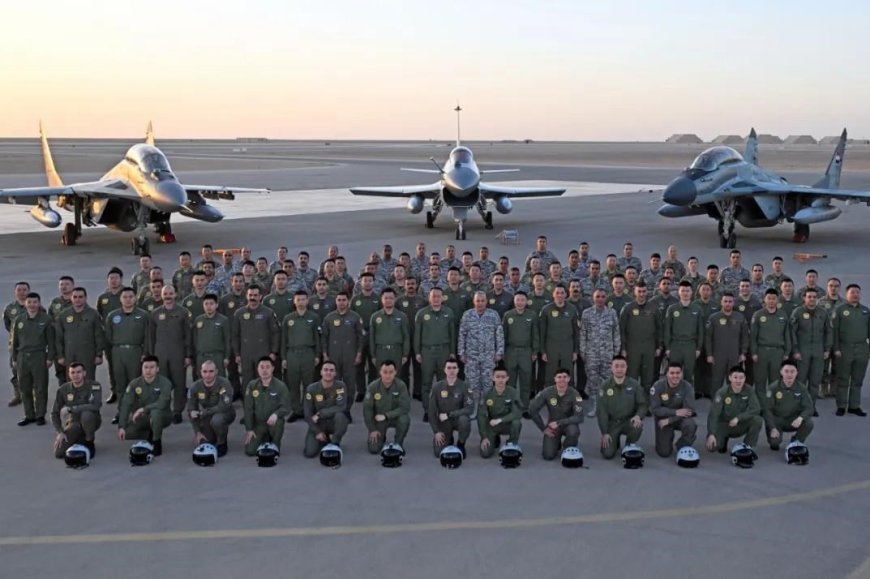Tectonic Shift in West Asia: Egypt and China Challenge U.S. Hegemony
Western countries’ policies towards West Asia and Africa in recent years have clearly demonstrated a meticulous plan for maintaining their influence over these resource-rich and strategic regions. The United States, through establishing numerous military bases in these areas, has ensured control over the key hubs of energy and trade transit. This dominance significantly contributed to America’s post-Cold War hegemony.

"Tectonic Shift in West Asia: Egypt and China Challenge U.S. Hegemony”
In recent days, the news of a joint military exercise between Egypt and China has been widely reflected in international media. Historically, Egypt has heavily relied on military equipment and support from the United States, with much of its arsenal supplied by Western countries. In addition to military assistance, Egypt has also received substantial annual financial subsidies from the U.S., casting a long shadow over the independence of this ancient nation.
Recognizing this situation, China has expanded its relations with Egypt over the past five years, enticing the Sisi government with attractive economic, political, and military offers. The joint military exercise between the two countries signifies a mutual desire to strengthen bilateral ties. Understanding the deeper reasons behind this development at this particular time requires a more thorough analysis, which will be elaborated below:
Preparing for Regional and Global Threats
Both China and Egypt operate in an era filled with a variety of soft and hard threats. China’s rapid progress in recent years has placed it under the radar of Western powers, with the United States repeatedly identifying China as its greatest military and economic threat. Meanwhile, Egypt, due to its more independent approach over the past three years and its growing alignment with Eastern powers, has also drawn Western sensitivity. One of the most contentious events in Egypt-U.S. relations was the dispute between President Sisi and President Trump over the Gaza issue and the proposed relocation of Gaza residents to Egypt, leading to an unprecedented cooling of ties between Cairo and Washington.
This situation has opened the door for strategic proximity between China and Egypt. Conducting large-scale military exercises and the importation of Chinese weaponry into Egypt’s traditionally Western-trained military could, in the coming years, significantly increase Cairo’s dependence on China. The transfer of Chinese military technology and the training of an army previously educated by the United States sends a clear message to Western governments: China is poised to play a powerful role in the military sphere in the coming years, and Egypt's evolving stance on international developments reflects this shift.
Balancing Power in West Asia and North Africa
Western countries’ policies towards West Asia and Africa in recent years have clearly demonstrated a meticulous plan for maintaining their influence over these resource-rich and strategic regions. The United States, through establishing numerous military bases in these areas, has ensured control over the key hubs of energy and trade transit. This dominance significantly contributed to America’s post-Cold War hegemony.
China’s growing presence in these regions—through establishing military bases and supplying advanced weaponry to powerful West Asian countries—not only threatens to reduce U.S. influence but also has the potential to alter the international balance of power. Regional U.S. strategic partners such as the UAE, Turkey, and Saudi Arabia have become increasingly sensitive to China’s palpable hegemonic influence.
Experts argue that China’s growing military presence in Egypt—coinciding with simultaneous U.S.-Saudi joint military drills—paints a complex picture of a region undergoing a major shift. As the China-U.S. rivalry intensifies, the balance of hegemonic power between East and West in West Asia and North Africa is likely to experience significant changes.
China’s Efforts to Reduce Egypt’s Dependence on Western Military Equipment
According to an unwritten pact, Egypt has received billions of dollars in annual subsidies from the United States in exchange for providing logistical facilities for U.S. naval vessels in the Suez Canal, granting flight privileges in Egyptian airspace, and maintaining dependency on American weaponry. However, amid growing tensions between Egypt and the United States in recent months, the Sisi government has sought to diversify its strategic options by allowing China to expand military exchanges, thereby reducing Egypt’s dependence on U.S. financial and military aid.
China, aiming to deepen its influence in North Africa, secure a strong presence in the Suez Canal, and showcase its advanced military capabilities, is strategically working to diminish Egypt’s military reliance on the West. Chinese military companies play a crucial role in this strategy. By establishing a foothold in Egypt, these companies gain access to a vast consumer market, and other regional countries—witnessing the performance of Chinese military technology—may also turn to Beijing for arms purchases. If this trend continues, Chinese defense firms could eventually replace Western ones as dominant suppliers in West Asia and North Africa.
Conclusion
In conclusion, China’s increased presence in Egypt will likely have indirect repercussions throughout the region. Other regional countries, depending on the nature of their relationships with the United States, may leverage China's capabilities to foster their own growth and development. The intensifying competition between the U.S. and China could create a new balance in the region’s foreign relations, potentially diminishing Western hegemony in the medium term.
Translator: Ashraf Hemmati













































